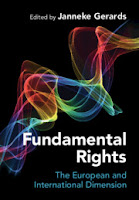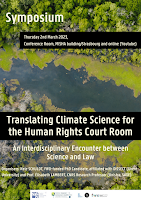Please find below the newest selection of academic publications related to the European Convention on Human Rights, its Court and case-law:
‘This paper aims to offer a fresh start for addressing several conundrums relating to hate speech. The method of research combines a conceptual analysis with a possible model for evaluating the European Court of Human Rights’ (ECtHR) decisions on hate speech. First, drawing on a Gricean account of communication, the argument proposes a working definition of hate speech: hate speech is best understood as a public speech act, aimed at subordinating individuals, which causes harm to targeted groups. Second, the paper offers a taxonomy of the different forms of hate speech, based on their degree of explicitness and detachment from the speaker’s intentions. The most explicit forms of (harmful) hate speech – e.g., racial slurs, fighting words, or overtly sexist remarks – will be distinguished from implicit forms of (harmful) hate speech – e.g., innuendo, insinuation, and irony. Third, the author develops a categorical framework for hate speech that can be used as a standard for evaluating the jurisprudence of the ECtHR. The author also discusses three limitations of the model: a) the absence of a European consensus, b) puzzled speakers, and c) difficulty in determining harm.’
‘This article discusses the right of access to a court in the most recent case law of the European Court of Human Rights, more particularly the application of the so-called Eskelinen-test in the context of cases concerning domestic Judges. The Court appears to have established a new approach to this test, which considerably raises the bar to exclude Judges from access to a court when disputes about their status or career are concerned. First, the article discusses this new approach, suggesting that the reason for it can be found in the current rule of law landscape in Europe and highlighting its potential for future rule of law related cases. Yet, it equally points out how the test gives the final say in disputes about the status or career of Judges to Judges themselves, which creates potential issues of internal judicial independence, and may skew sensitive systems of balance of powers.’
* Johan Vorland Wibye, ‘Beyond Acts and Omissions — Distinguishing Positive and Negative Duties at the European Court of Human Rights’,
Human Rights Review , vol. 23, issue 4 (December 2022):
‘The article examines methods of distinguishing positive and negative duties within the provisions of the European Convention of Human Rights as applied by the European Court of Human Rights. It highlights problems with tying positive duties to acts and negative duties to omissions, and sets out a supplemental delineation method when those problems lead to systematic classification errors: duties sort as positive if they have the capacity for multiple fulfilment options and negative if they only allow one fulfilment option. These delineation criteria allow for a more consistent reconstruction of case law and point to a causal mechanism for alleged asymmetries in proportionality review and margins of appreciation. Lastly, there are revisionary implications for human rights scholarship. Judgments have been sorted as positive rights cases because they feature a requirement that states commit to legislative amendment, yet performative acts of amendment may be continuous with underlying negative duties.’
* Philip Czech, Lisa Heschl, Karin Lukas, Manfred Nowak, Gerd Oberleitner (eds), European Yearbook on Human Rights 2022 (Intersentia 2023) has bee published. The section on the Council of Europe and the ECHR includes the following items:
- The Evolving Jurisprudence of the European Court of Human Rights on Domestic Abuse (p. 205);
- The International Debate on AI Regulation and Human Rights in the Prism of the Council of Europe’s CAHAI: Great Ambitions (p. 225);
- Human Rights and Social Media: The European Court of Human Rights in the Digital Era (p. 253);
- The Freedom of Expression of the Judiciary as a Special Case of State Personnel: A European Human Rights Perspective (p. 283);
- Exploring Narratives about ‘Cancel Culture’ in UK Educational/ Employment Settings under the ECHR (p. 309);
- Consistency, Coherence and the Turn Towards Procedural Review in the European Court of Human Rights (p. 345);
- The Execution of ECtHR Judgments Related to Inter-State Disputes (p. 379);
- Lessons from the Inter-American Human Rights System to Further Utilise the Potential of NHRIs in the European Convention System: From Contextualisation to Inspiration? (p. 409);
- The Turkish Post-Coup Emergency and European Responses: Shortcomings in the European System Revisited (p. 445);
- Militant Democracy in the ECtHR Case Law on Genocide Denial Bans (p. 483);
- From the Right to Science to the Right to Open Science: The European Approach to Scientific Research (p. 515);
- Religious Accommodation before the European Court of Human Rights: Moving Forward a New Approach Towards Religious Minorities? (p. 543).
‘Consensus analysis is a method of interpretation and an argumentative practice employed by some of the highest courts in multilevel legal systems, ranging from national federations to systems with origins in international law. In its most basic and most prevalent form, consensus analysis is used by courts when they interpret a legal norm of a higher-level legal order based on how this norm had been interpreted and implemented in lower-level legal orders – the constituent states. Though there is abundant literature on the applications of consensus analysis within specific jurisdictions, few, if any at all, have attempted to transcend the dependence of their analyses on a specific systemic context and to examine consensus analysis as a practice in the abstract. This chapter aims to begin to fill this gap. It analyses consensus analysis as used by the United States Supreme Court, the Court of Justice of the European Union, and the European Court of Human Rights to inductively devise a general typology of consensus analysis as used across different courts and institutional contexts. Establishing this typology is instrumental to our understanding that consensus may serve either as a converging or diverging mechanism for resolving conflicts in multilevel legal orders. Which of the two functions it serves will depend on what type of consensus is used by a specific court in an individual case.’
* Marco Fisicaro, 'Judicial Independence (and Subsidiarity) through Interim Measures: The New ECtHR’s Strategy at the Height of the Polish Constitutional Crisis', Diritti Umani e Diritto Internazionale, vol. 16, no. 3 (2022), pp. 637-658.





%20(1).jpg)


.jpg)
